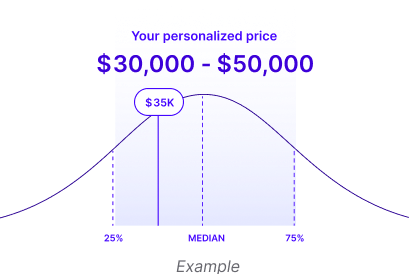Ledgy
Fast, fair, easy pricing. No sales call required.
How much does Ledgy cost?
When negotiating with Ledgy, focus on the value that their equity management platform provides to startups and publicly listed companies. Highlight your company's specific needs for scalability, automation, and compliance, as these are key features of Ledgy's offerings. Emphasize the potential for cost savings through streamlined processes and reduced administrative burdens.Given that Ledgy has various pricing tiers (Scale, Public, Growth, and Enterprise), it's essential to discuss which tier aligns best with your business needs. This allows for flexibility in negotiations, where you could seek discounts or additional features based on your commitment level or the scale of your planned usage. Moreover, understanding their average contract values can help in setting realistic budget expectations.
See detailed pricing for your specific purchase
AI Quote Analysis
Upload your quote to check if you’re getting a fair price, under 2 minutes and completely free.

How does Ledgy price and package their products?
View pricing on Ledgy's website
Product:
Scale
Varies depending on company sizePayment Terms: AnnualPopular Features: Equity management at scale
Other companies you may be interested in
Negotiating with Ledgy
Negotiation Tips
Introduce competitors to demonstrate your options and leverage their quotes to secure lower pricing or better terms. Emphasize that your finance team has requested alternative pricing quotes to ensure competitive positioning. Highlight any competitive bids directly and bolster your case by stating that maintaining a relationship with the chosen vendor requires matching or justifying price values.
Emphasize your company's concerns about ROI and that management is required to only approve short-term contracts due to budget scrutiny. By applying pressure based on limited budget approvals, you encourage the vendor to accommodate a shorter-term agreement, which can ease financial commitments and allow for reevaluation.
When negotiating, demonstrate significant growth expectations within your company to leverage economies of scale. Outline your projections clearly, indicating that your growth is tied to more favorable pricing arrangements. This tactic works best when addressing requirements for larger user bands or increasing access to software licenses based on high user demand.
Offer your willingness to provide feedback or participate in case studies in exchange for pricing reductions. Highlight the marketing value of your partnership to secure better terms, while ensuring that the agreement reflects a reciprocal relationship benefiting both parties.
Considerations when buying Ledgy
OwnershipLedgy is owned by Ledgy AG.
Fiscal year endDecember 31
Best months to buyMarch, June, September
Payment TermsAnnual payments preferred, Monthly payments can be negotiated
Upgrades/downgradesYes, Ledgy offers both upgrades and downgrades for its services, making it easy for users to adjust their resources as their needs change.
Redline thresholdRedline threshold estimate is $50k.
Vendr community insights for Ledgy
What real buyers recommend in the negotiation process
Company with 201-1000 employeesA while ago
Ledgy were stubborn with their discounting but we managed to get a 10% discount as well as 3 free months included.Additional Info
What is Ledgy?
The Equity Management platform used by leading companies. Made for startups, great for investors. 🚀Ledgy's 4 Product
Ledgy: Enterprise
For companies that need the most sophisticated functionality, get enhanced security, control and support.Ledgy: Growth
Save precious time with automated document workflows, compliance reports and valuation services.Ledgy: Public
Publicly listed entities can access automated share plan administration, robust financial reporting, enhanced security and support.News that may impact Ledgy pricing or negotiations
Tech.eu
Ledgy dives into collaboration with SeaO₂ to help bring its pioneering oceanic carbon capture technology to lifeApril 13, 2023FinTech Futures
Employee equity management platform Ledgy raises $22m Series BSeptember 23, 2022Venturelab
Ledgy raises USD 22 million Series B to fund European expansion of its equity management platform for high-growth international startupsSeptember 21, 2022